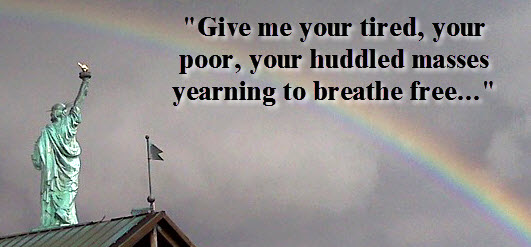Invasion of the ‘Caravan Horde’: Fact – Fiction - Values
Posted November 11, 2018 03 pm| Op-Ed

As both an anthropologist and educator, what is astonishing for me is the level of racist discourse promoted by President Trump and his administration against hapless refugees and the so-called threat they pose. Immigrants, as a major threat to the security of the nation is hyped-up racist rhetoric and completely false.
The vitriol against the caravan of Central Americans and Mexicans on their way to the US border was cruel electioneering, no more. These people are poor and are fleeing horrific violence in their home countries. Some of this violence has been caused by U.S. policies in the region.
Trump has staged the National Guard at the border. Trump’s words of racist hatred have also inspired and summoned numerous paramilitary posses of armed militias to the US/Mexican borderlands.
Fear-mongering and racism against immigrants is nothing new in the history of the United States.
Toward the end of the 19th-century and into the 20th-century many in the US promoted “Nativism” — an all-white America where good jobs belonged to whites, not foreigners. Known as the “Second-Industrial Revolution,” the “Gilded Age,” and the “Progressive Era," it was a time of enormous economic transformation for the country through industrialization and urbanization.
In the Gilded Age conditions in manufacturing were generally deplorable for all new immigrants. Workers were not protected and required to work 14-16 hour days, six or seven days a week, nearly 365 days a year. Children worked too and were not required to attend school. A typical unskilled laborer at the time earned no more than $8-10 per week.
In the Chicago Haymarket Riot of 1886, several German immigrants were unfairly accused of instigating a protest where policemen were killed. The injustice of the trial was so evident that the governor of Illinois commuted some of the sentences of those accused.
Upton Sinclair’s historical novel, The Jungle (1904), illustrates these hazardous conditions for immigrants in Chicago’s meatpacking industry—lost limbs and digits, no workman’s compensation, unsanitary conditions, and dangerous work.
Those on the West Coast, who blamed the loss of jobs and low wages on Chinese immigrants, fought for the passage of the 1882 Congressional Chinese Exclusion Act. In 1907, a “Gentleman’s Agreement” with Japan restricted Japanese emigration.
The Immigration Act of 1924 limited immigration of Eastern and Southern Europeans such as those with Greek, Italian, Polish, and Jewish origins and banned virtually all Asians.
During WWII some 100,000 Japanese-Americans were imprisoned between 1942 and 1945.
Without voices to protest, immigrants are easy scapegoats and targets.
Wanting better lives for their families, immigrants are often the hardest working populations under the worst conditions.
The immigrants coming from Mexico and Central America are people who work in the fields, do domestic work, care for our children, labor in meatpacking plants, mow our lawns, clean motel rooms, and prepare our food in the restaurant industry.
I have been advocating on behalf of the Guatemalan-Maya population since 1990. Many of these immigrants arrived here from the genocide and civil war in Guatemala, where the US was involved in training the country’s military leaders in the School of the Americas and supplying the military junta with weapons.
During the 1980s, the US intervened in civil wars in Central American. U.S. military interventionism was “justified” as against the spread of communism.
U.S. economic trade policies of the 1990s, such as NAFTA (North American Free Trade Agreement), have consistently undermined the economic opportunities of those living in countries like El Salvador, Honduras, and Guatemala. Employers in Central America have consistently violated minimum wage agreements and fair labor conditions.
The 5,000 people coming from El Salvador, Guatemala, Honduras, and Mexico pose no threat to the security of the United States and it will not be difficult to prevent them from crossing our border.
Fake news created by President Trump and his administration persists:
• Our
Pentagon says there is no threat of Middle Eastern
terrorists amongst this caravan of mostly poor Central
Americans.
•
Nor was the Democratic Party responsible for
organizing the caravan. Migrant caravans have been
coming to the United States-Mexican borders for years
under both Republican and Democrat administrations.
•
Traveling in numbers makes the journey safer for
these migrants. Often migrants are commonly victims of
real threats of violence along the way—murder, rape, and
robbery.
• The
Honduran government is not financially supporting the
caravan.
•
These people cannot just return to their home countries
and apply for political asylum there. They must be in
the United States to apply for asylum and citizenship. The situation in Central America is a large scale
humanitarian crisis, a crisis largely caused by U.S.
policies in the region.
Do not be fooled by President Trump’s racist rhetoric.
Those in the Caravan are desperate human beings wanting survival for their families. They are not security threats. They should be given the same opportunities as our ancestors arriving at Ellis Island.
Emma Lazarus’ words inside the pedestal of the Statute of Liberty should echo with everyone: "Give me your tired, your poor, your huddled masses yearning to breathe free ... Send these, the homeless, tempest-tossed to me, I lift my lamp beside the golden door!"
---------
J. P. Linstroth is a former Fulbright Scholar to Brazil. He has a PhD from the University of Oxford. He is the author of Marching Against Gender Practice (2015) and is syndicated by PeaceVoice.
Graphics and layout added by the Observer
Original Graphic by NPS
This piece was reprinted by the Columbia County Observer with permission or license.

 By
J.P. Linstroth
By
J.P. Linstroth